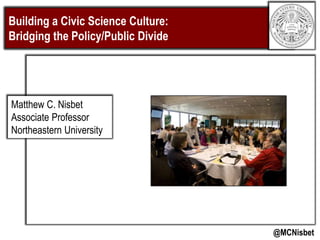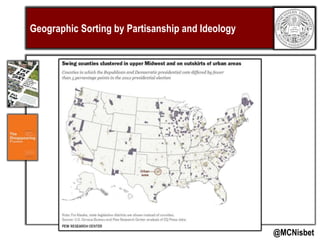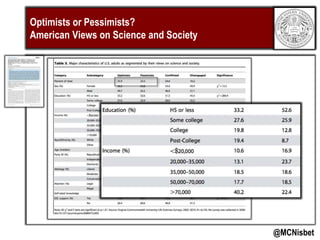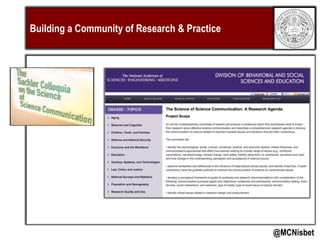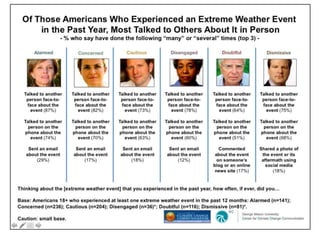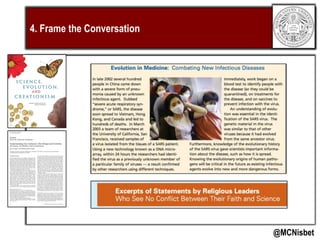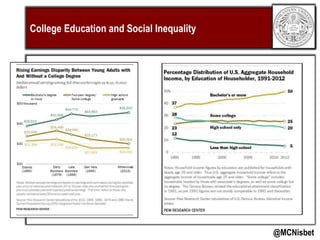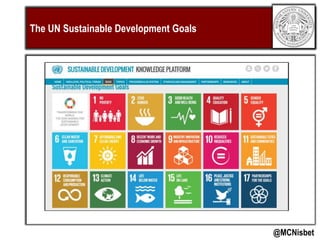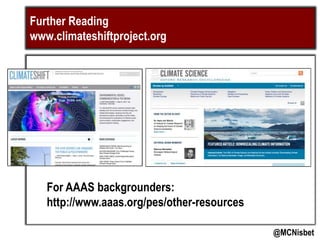Nisbet aaas sept2016
- 1. Building a Civic Science Culture: Bridging the Policy/Public Divide @MCNisbet Matthew C. Nisbet Associate Professor Northeastern University
- 2. Political Polarization and Gridlock @MCNisbetFrom Keith Poole’s Vote View blog Sputnik – Apollo NEPA GH BUSH
- 3. LCV: Environmental Voting Scores @MCNisbetDunlap, R. E., McCright, A. M., & Yarosh, J. H. (2016). The Political Divide on Climate Change: Partisan Polarization Widens in the US. Environment: Science and Policy for Sustainable Development, 58(5), 4-23.
- 4. Political Polarization and Gridlock @MCNisbet
- 5. The Science Literacy Paradox: Smart Partisans and Biased Opinions @MCNisbet Dan Kahan Kahan, D. M., Peters, E., Wittlin, M., Slovic, P., Ouellette, L. L., Braman, D., & Mandel, G. (2012). The polarizing impact of science literacy and numeracy on perceived climate change risks. Nature Climate Change, 2(10), 732-735.
- 6. Geographic Sorting by Partisanship and Ideology @MCNisbet
- 7. Geographic Sorting by Partisanship and Ideology @MCNisbet
- 8. Partisan Sorting and Climate Change Beliefs @MCNisbet
- 9. Partisan Sorting Within Science and Academia @MCNisbet
- 10. Selective Attention to Science and Society Debates @MCNisbet Nisbet, M.C. & Markowitz, E. (2015). Expertise in an Age of Polarization: Evaluating Scientists’ Political Awareness and Communication Behaviors. Annals of the American Academy of Political and Social Science, 658, 136-154..
- 11. Rapid Transformation of News & Political Discourse @MCNisbet
- 12. Politicizing Perceptions of Ebola @MCNisbet Nisbet, M.C. & Markowitz, E. (2016, March). Americans’ Attitudes About Science and Technology: The Social Context For Public Communication. AAAS Leshner Leadership Institute. Washington, DC: American Association for the Advancement of Science.
- 13. Wicked Problems in a Runaway World @MCNisbet o Wicked problems like climate change, pandemics, and social inequality span national borders and class distinctions, disrupting entire economies, political systems, and ways of life. o They are rooted in our own success as a modern society, tangled up with industrialization, free trade, scientific advances, global communications, and higher standards of living. They have no single cause and no clear solution. Can only do better or worse at managing over time. o Yet our inability to effectively manage these transcendent threats has created new sources of public doubt and anxiety, eroding trust in government and expert authority, creating a deep sense of social malaise. Nisbet, M.C. (2014). Disruptive Ideas: Public Intellectuals and their Arguments for Action on Climate Change. Wiley Interdisciplinary Reviews Climate Change, 5, 809–823..
- 14. Political Control in an Age of Post-Normal Science @MCNisbet o Controversies over climate change, food biotech, and nuclear energy are debates over political control. o Appeals to scientific authority obscure competing views of nature, government, the market, justice, progress, autonomy and community. o Which values, interpretations, and worldviews matter and who gets to decide? o Focusing on the translation of scientific evidence often fuels polarization, since such evidence is often sufficiently tentative enough to indefinitely support the values-based arguments of competing sides. Nisbet, M.C. (2014). Engaging in Science Policy Controversies: Insights from the U.S. Debate Over Climate Change. Handbook of the Public Communication of Science and Technology, 2nd Edition. London: Routledge (pp. 173-185).
- 15. Americans Lose Faith in Government @MCNisbet
- 16. Brexit: Globalization, Resentment, and Alienation @MCNisbet
- 17. Science Literacy and Educational Disparities @MCNisbet
- 18. Optimists or Pessimists? American Views on Science and Society @MCNisbet
- 19. Scientists Enjoy Strong Communication Capital @MCNisbet
- 20. Climate Scientists & Federal Agencies Most Trusted @MCNisbet
- 21. Science Communication & Outreach Training @MCNisbet
- 22. Building a Community of Research & Practice @MCNisbet
- 23. 1. Dialogue, Networks, and Trust Matter @MCNisbet Social relationships, networks, and identities Trust, credibility, alienation relative to science-related institutions The uptake and influence of “expert” science- related knowledge Practical reason, localized knowledge Bryan Wynne
- 24. Common Criteria Used to Judge Expert Advice @MCNisbet 1) Does expert knowledge work? Do predictions fail? 2) Do expert claims pay attention to other available knowledge? 3) Are experts open to criticism? Admission of errors, or oversights? 4) What are the social / institutional affiliations of experts? Historical track record of trustworthiness, affiliation with industry? 5) What issues overlap or connect to lay experience?
- 25. The Case of Floating Wind Turbines in Maine: Common Questions Asked about the Project @MCNisbet 1) Technical specifics related to the technology 2) How does this compare to Cape Wind? Who are the financial backers? Who controls decisions? 3) What do Mainers get? What is Maine getting out of this? How will this benefit Mainers? Will it raise cultural esteem and status? 4) How many jobs will be created? How many will stay in Maine and for how long? What are the benefits to our town? 5) How will this impact coastal lives and livelihoods? Will it impact the fishing industry and coastal wildlife?
- 26. Community Dialogue After Hurricane Isabel Anne Arundel County, Maryland @MCNisbet
- 28. 2) Identify and Work with Opinion-Leaders @MCNisbet o Follow closely news and events related to science- related issue or public affairs. o Among peers, are trusted sources of information on these topics & frequently share information. o Are more politically active and more involved in their communities. o Early adopters of behaviors & technologies, supporters of policies, and talk them up with others, providing advice and recommendations. Nisbet, M. C., & Kotcher, J. E. (2009). A two-step flow of influence? Opinion-leader campaigns on climate change. Science Communication.
- 29. 2) Identify and Work with Opinion-Leaders @MCNisbet
- 36. 3. Diversify Discourses & Policy Options: Sustainability Problems as Wicked Problems @MCNisbet o The more complex a problem like climate change, the more equally plausible discourses and narratives exist about what should be done. o Climate change serves as an opportunity for different groups to mobilize on behalf of their values, goals and vision for society. o Climate change is “a synecdoche – a figurative turn of phrase in which something stands in for something else—for something much more important than simply the way humans are changing the weather,” – Mike Hulme
- 37. @MCNisbet Nisbet, M. C. (2014). Disruptive ideas: public intellectuals and their arguments for action on climate change. Wiley Interdisciplinary Reviews: Climate Change, 5(6), 809-823.
- 38. Diversifying Policy and Technology Options @MCNisbet Kahan et al 2007 Pielke 2007
- 39. Expanding the Conversation Beyond Renewables @MCNisbet Union of Concerned Scientists (2016). Massachusetts Electricity Future.
- 40. Best Practices in Providing Expert Advice @MCNisbet o Be policy relevant, not policy prescriptive. Rather than arguing for specific policy outcome, work to make sure that science is used in reaching decision. Try to expand discussion of policy options and solutions, rather than narrow them. o Partner with other experts and stakeholders who can speak to multiple dimensions of a science-related issue. Emphasize consensus evidence endorsed by diversity of expert bodies or groups. o Openly talk about uncertainty and be transparent in how uncertainty is resolved and conclusions reached. Emphasize openness to scrutiny and correction by peers, journalists, and the public. Jamieson, K. H., & Hardy, B. W. (2014). Leveraging scientific credibility about Arctic sea ice trends in a polarized political environment. Proceedings of the National Academy of Sciences, 111(Supplement 4), 13598-13605; Druckman, JN (2015). Communicating Policy-Relevant Science. PS: Political Science & Politics , 48 (S1), 58-69.
- 41. 4. Frame the Conversation @MCNisbet
- 42. 5. Invest in Boundary Organizations & Professionals @MCNisbet
- 43. 5. Invest in Boundary Organizations & Professionals @MCNisbet
- 44. 5. Invest in Boundary Organizations & Professionals @MCNisbet
- 45. 6. Coordinate Strategy on Breakthrough Issues @MCNisbet
- 46. College Education and Social Inequality @MCNisbet
- 47. The UN Sustainable Development Goals @MCNisbet
- 48. 6. Coordinate Strategy on Breakthrough Issues @MCNisbet o On these issues, which strategies promote local and national dialogue? What questions do the public and policymakers have? o Which opinion leaders make valuable partners and should be the focus of engagement? How can social media be leveraged? o Can expert analysis and advice expand the menu of policy options for addressing these issues? o Which frames of reference and storylines convey relevance and reduce motivated reasoning? o What are the existing or needed boundary organizations?
- 49. Further Reading www.climateshiftproject.org @MCNisbet For AAAS backgrounders: http://www.aaas.org/pes/other-resources

